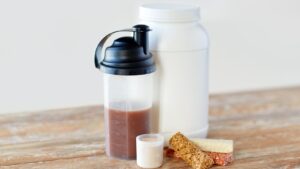In the fast-paced world of fitness and athletics, staying hydrated and energized is crucial. Enter prime sports drinks, a staple for athletes and fitness enthusiasts alike. These beverages promise to replenish electrolytes, boost energy, and enhance performance. But what exactly goes into these colorful bottles, and how do they support your body’s needs?
Understanding the nutrition facts of prime sports drinks can help consumers make informed choices that align with their fitness goals. From carbohydrates and electrolytes to vitamins and minerals, each ingredient plays a specific role in hydration and energy. Whether you’re a seasoned athlete or a weekend warrior, knowing what you’re consuming can make all the difference in achieving optimal performance.
Prime Sports Drink Nutrition Facts
 Prime sports drink nutrition facts are crucial for making informed hydration choices. A serving typically contains 20 to 30 grams of carbohydrates, vital for energy replenishment during strenuous activities. Carbohydrates, in gel or liquid form, restore glycogen levels efficiently.
Prime sports drink nutrition facts are crucial for making informed hydration choices. A serving typically contains 20 to 30 grams of carbohydrates, vital for energy replenishment during strenuous activities. Carbohydrates, in gel or liquid form, restore glycogen levels efficiently.
Electrolytes such as sodium and potassium appear prominently in the nutrition facts. These help maintain fluid balance and muscle function, which is essential for peak athletic performance. A typical bottle might contain 200 mg of sodium and 150 mg of potassium.
Vitamins and minerals, often highlighted in the nutrition facts, support overall wellness. B vitamins play a role in energy metabolism, while antioxidants like vitamin C aid in combating exercise-induced oxidative stress. A serving of a prime sports drink might include 100% of the daily value for vitamin C.
Understanding these prime sports drink nutrition facts helps consumers choose products that enhance performance and recovery in their active lifestyles.
Benefits of Prime Sports Drink
 Prime sports drinks offer several benefits that align with athletic and fitness goals. They provide hydration and energy replenishment through their rich composition. Containing 20 to 30 grams of carbohydrates per serving, they supply the necessary energy for high-intensity workouts. Electrolytes such as sodium and potassium, found in prime sports drinks, help maintain fluid balance and support optimal muscle function, critical during and post-exercise.
Prime sports drinks offer several benefits that align with athletic and fitness goals. They provide hydration and energy replenishment through their rich composition. Containing 20 to 30 grams of carbohydrates per serving, they supply the necessary energy for high-intensity workouts. Electrolytes such as sodium and potassium, found in prime sports drinks, help maintain fluid balance and support optimal muscle function, critical during and post-exercise.
The inclusion of vitamins and minerals enhances these beverages’ nutritional value. Prime sports drinks often contain B vitamins, aiding in energy metabolism, and antioxidants like vitamin C to combat oxidative stress. With up to 100% of the daily value of vitamin C in some products, they generate an added layer of benefit for those with active lifestyles.
By choosing drinks based on these attributes, individuals can optimize their athletic performance and recovery, ensuring they meet their nutritional needs with prime sports drinks.
Potential Drawbacks
 Prime sports drinks might have potential drawbacks that consumers should consider. Although they provide hydration and energy, they often contain high sugar levels. Excessive sugar intake can lead to weight gain and dental issues when consumed frequently. Prime sports drinks might also include artificial colors and flavors, which can cause reactions in sensitive individuals. While sodium is essential for electrolyte balance, too much sodium may elevate blood pressure levels for some people. Additionally, not all prime sports drinks suit every physical activity; those casually exercising might not need the added carbohydrates and electrolytes. Consumers should assess their activity intensity and dietary needs to select the most appropriate beverage.
Prime sports drinks might have potential drawbacks that consumers should consider. Although they provide hydration and energy, they often contain high sugar levels. Excessive sugar intake can lead to weight gain and dental issues when consumed frequently. Prime sports drinks might also include artificial colors and flavors, which can cause reactions in sensitive individuals. While sodium is essential for electrolyte balance, too much sodium may elevate blood pressure levels for some people. Additionally, not all prime sports drinks suit every physical activity; those casually exercising might not need the added carbohydrates and electrolytes. Consumers should assess their activity intensity and dietary needs to select the most appropriate beverage.
Comparing Prime Sports Drink to Competitors
Prime sports drinks stand out in the crowded market by focusing on a balanced nutritional profile that caters to athletes’ needs. While competitors may offer similar benefits, Prime’s emphasis on essential electrolytes and vitamins gives it an edge in promoting hydration and energy replenishment. Consumers should weigh the nutritional content against other options, considering factors like sugar content and artificial additives. By carefully comparing these elements, individuals can choose a sports drink that aligns with their fitness goals and dietary preferences. Ultimately, selecting the right beverage can significantly impact athletic performance and overall health, making informed choices crucial for anyone looking to enhance their active lifestyle.

